In the diary below this, my esteemed co-contributor midtowng argues that "we are facing the most serious recession of our lifetime." He notes that while he might be ignored, you ought to pay attention to George Soros, and belittles the politicians and other morons (I guess that would include me) who have argued that this recession might be over by election day.
In the spirit of economic debate on this site, here's what I believe he is overlooking:
1. Soros may be a great currency trader and social commentator but...
"The global capitalist system… is coming apart at the seams". So declared capitalist and arch-speculator George Soros before a US congressional enquiry...*. He has since expanded on this in a book entitled The Crisis of Global Capitalism. What has he in mind?
By "global capitalist system" Soros [means] the more restricted sense of present world financial arrangements which allow the more or less free movement of capital throughout the world:
"The global economy is characterized not only by free trade in goods and services but even more by the free movement of capital. Interest rates, exchange rates, and stock prices in various countries are intimately interrelated, and global financial markets exert tremendous influence on economic conditions. Given the decisive role that international financial capital plays in the fortunes of individual countries, it is not inappropriate to speak of a global capitalist system" (Introduction).
....
"To put it bluntly, the choice confronting us is whether we will regulate global financial markets internationally or leave it to each individual state to protect its own interests as best it can. The latter course will surely lead to the breakdown of the gigantic circulatory system, which goes under the name of global capitalism" (p. 176).
....
"Market fundamentalists have a fundamentally flawed conception of how financial markets operate. They believe that financial markets tend towards equilibrium… Financial markets are characterized by booms and busts and it is quite amazing that economic theory continues to rely on the concept of equilibrium, which denies the possibility of these phenomena, in face of the evidence. The potential for disequilibrium is inherent in the financial system; it is not just the result of external shocks" (Introduction).
....
"… the capitalist system by itself shows no tendency toward equilibrium. The owners of capital seek to maximise their profits. Left to their own devices, they would continue to accumulate capital until the situation became unbalanced. Marx and Engels gave a very good analysis of the capitalist system 150 years ago, better in some ways, I must say, than the equilibrium theory of classical economics"
....
A transactional society undermines social values and loosens moral constraints. Social values express a concern for others. They imply that the individual belongs to a community, be it a family, a tribe, a nation, or humankind, whose interests must take precedence over the individual's self-interests. But a transactional market economy is anything but a community. Everybody must look out for his or her own interests and moral scruples can become an encumbrance in a dog-eat-dog world. In a purely transactional society, people who are not weighed down by any considerations for others can move around more easily and are likely to come out ahead"
- George Soros, "The Crisis of Global Capitalism"
* The date of this quote: September 19, 1998.
Soros' predictions of the great global unraveling seems to be, uhmmm, well, rather lackadaisical in arriving, and let's just leave it at that. Warren Buffett, to his credit, openly admits that he has a poor track record of reading the economy as opposed to reading a terrific bargain in the stock market.
2. The Conference Board are not "politicians".
The diary below, saying that "Politicians say" the recession is bottoming, links to the Conference Board's Leading Economic Indicators.
The problem is, they have no incentive to cook the data. In fact, the better they call a recession (or not) the better their reputation and the better they can sell other services. The link in the diary below mine cites to the Leading Economic Indicator series, which did accurately enough go negative late last year, and has improved a little since.
3. Mortgage rates are increasing?
The diary below mine cites a quote indicating that mortgage rates are increasing. True, they are higher than they were a few months ago. But here's a graph of mortgage rates for the last five years:
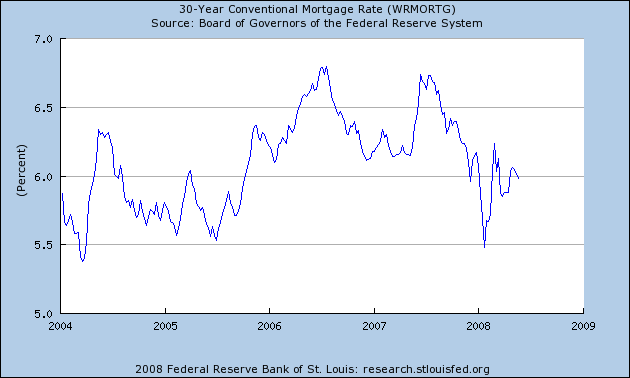
When you put this "increase" in perspective, do you see anything ominous there in the last few months? I sure don't.
4. Weekly unemployment claims are barely in recessionary territory (courtesy Calculated Risk):
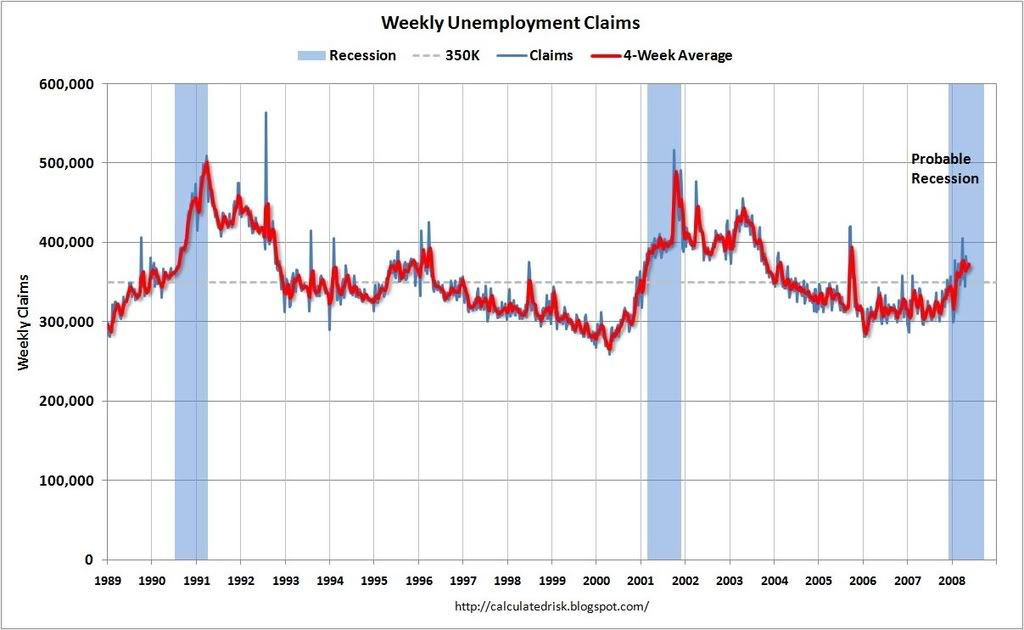
In every prior recession, they have exceeded 400,000, and once the claims started to grow, they grew sharply and quickly. Not so now.
5. Durable goods orders aren't in recession territory:
Another good sign of recession is the durable goods number. To give you a longer term view, I am using an industrial production of durable goods number, kept by the Federal Reserve for over 60 years:
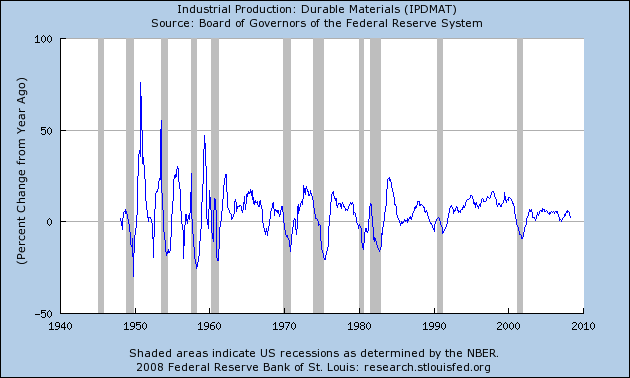
In every prior recession, that number was well below 0% (i.e., was in outright decline) during the recession. It isn't in recession territory yet.
6. Retail sales:
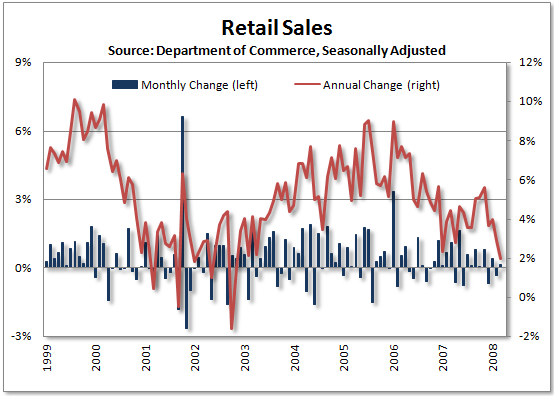
While negative in "real" i.e., inflation adjusted terms for several months, these too have refused to outright roll over.
7. One of the best predictors of all, the yield curve of the bond market, sides with the morons.
The yield curve inverted in 2007 (not by a lot), accurately foretelling the slowdown in the first part of this year. Since then, it has profoundly UNinverted, a sign of economic recovery within about 12 months thereafter:
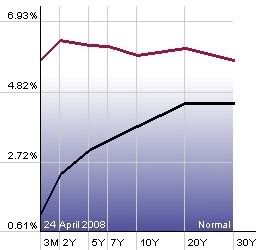
The website "Political Calculations" has a numeric calculator making use of the yield curve and the Fed funds rate which has an excellent record of calling recessions. That calculation shows that the economy had the biggest chance of being in recession last month, and almost no chance of being in recession next year:

I have written for several years that we are in a "Slow Motion Bust" that will take years to play out (and as to which this recession is only the opening act). I subscribe to the Kondratieff long wave interest rate cycle, and I believe we are entering or have been entering what some have described as the "winter" portion of that cycle (which would coincide with a credit crunch) for some time. Nevertheless, the data says this recession at least is likely to abate by the end of this year, and will probably be marked by a great reduction in oil prices.
The moral of this story: You are much better off taking a cold, hard, fish-eyed look at the data. Beware relying on pundits! Even if they are George Soros.
_________
P.S. Kudos to midtowng for spotting the Congressional bait-and-switch on the mortgage "bailout". It is an outrage, and he is absolutely right.

Comments
timing is everything
I'm wondering if midtown's coyote is simply in an updraft of the canyon.
I've just read both of these blog posts and the commonality that I see is both are saying we need dramatic policy change, now is it a dribble or a flood, I don't know.
To be fair, CNBC is a bunch of morons
I specifically reserved that label just for them because of their consistency of being wrong, refusing to listen to logic, and their dedication to cheerleading above all else. I didn't accuse them of being morons just because they are optimistic.
I've been wrong about the economy before, and I will be again. It's entirely possible that now is one of those times.
However, I feel so strongly that the American economy is in serious trouble, and that it will get worse (although I don't pretend to know the timing), that I've bet my lifesavings on it.
betting life savings
Regardless if this is a flood or an erosion, from the daily news millions are betting their live savings and losing it daily.
I don't know about you, but I see this as a national crisis and yet we have an election season focusing in on trivialities and "gotchas". It's truly fiddles while Rome burns to me.
Why Soros is wrong and the
Why does it really matter whether we are in a recession or not. The real question is how much investors make, and how much money workers make. For the most part all the economic growth goes to giving investors more money, while labor gets screwed. If labor received a larger slice of the pie, working people could make more money without growth.
Furthermore, what good are really being produced in GDP? Can gambling contribute to GDP? I think these issues more detailed study.
Good point
I wrote a diary a week or so ago called "Measuring the Decline of America" that agrees with point you raise.
A lot of times I seem to play the role of the curmudgeonly contrarian on the blogosphere, arguing that while things may not be going so well, the sky isn't falling either.
The ridiculous inequality in the sharing of the fruits of American effort are why 80% of Americans think this country is on the wrong track, and they are correct.
You cut to the heart of the matter
One thing that you here few ever say is that there is more than one type of capitalism out there. America only practices one type of capitalism, and it isn't laissez-faire.
Our type of capitalism has been rigged to the benefit of the ruling class, which is the worst of both worlds. But since the working class still doesn't identify itself as being part of the "have nots", this dysfunctional system continues.
With 75% underemployment
With 75% of this country earning less by their labors than they could, I personally think we haven't really been out of recession since 1998.
But that's using recession in a different way than most economists do- as a measure of living up to human potential instead of as a measure of how much the rich can soak the consumers for stuff they can provide for themselves without money.
-------------------------------------
Maximum jobs, not maximum profits.
flat wages
I know in engineering the salaries are pretty much at or below what they were in 1997/1998. If you're up for it a detailed (with statistics, graphs) analysis on just how badly the US middle class is affected would be good. I personally believe there are inflection points when they started outsourcing, plus the China PNTR deal kicked in and manufacturing left in droves. Add to that insourcing (bringing in cheap foreign labor to displace US citizens, labor arbitrage) I would not be surprised to see yet another inflection point in overall US wages correlating to those events. But, I haven't analyzed it in depth, would be a very good analysis topic.